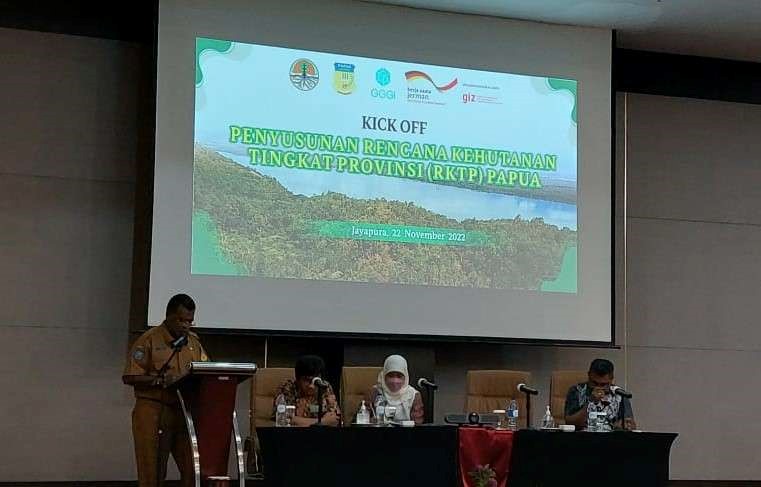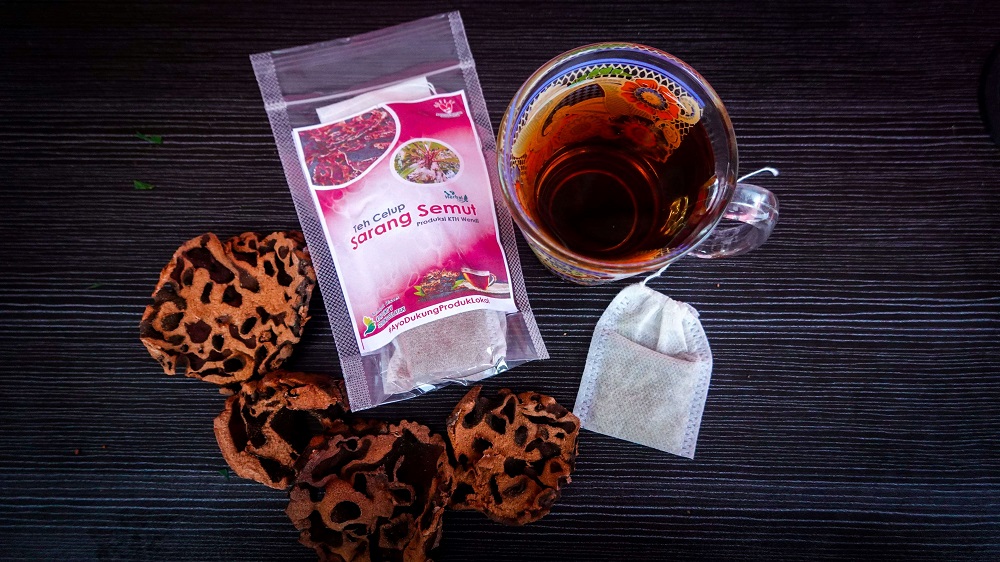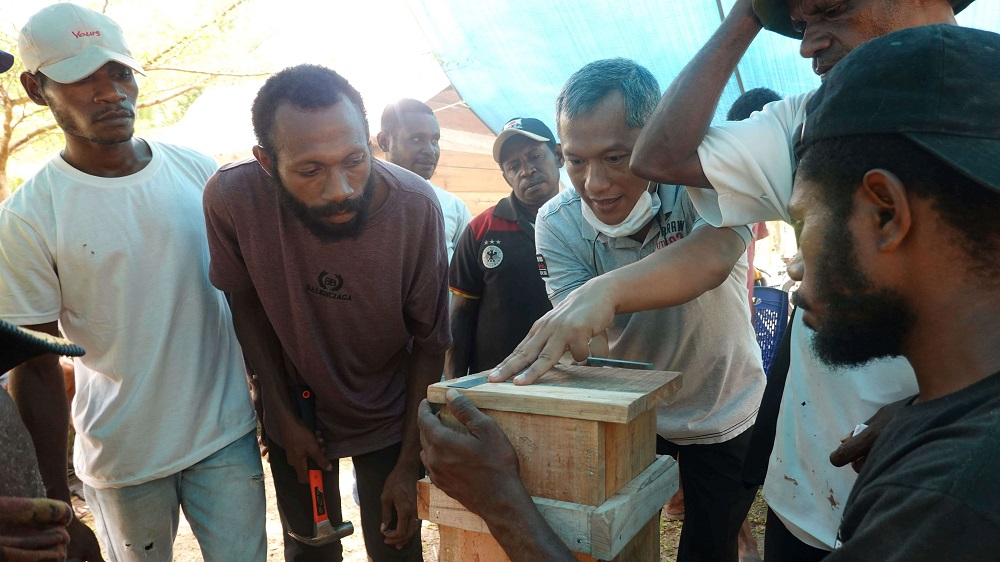FORCLIME
Forests and Climate Change ProgrammeTechnical Cooperation (TC Module)

Select your language

With the goal of developing a plan that addresses spatial use and sourcing potential for forest areas in Papua Province, the Papua Forestry and Environment Service, supported by FORCLIME, held a meeting to develop such a Provincial Level Forestry Plan (RKTP) on 22 November 2022 in Jayapura. The RKTP document is a plan that contains macro-directions for spatial areas or spaces and that addresses the potential of forest areas in terms of engagement in forestry development and the development of non-forestry initiatives that utilize forest areas. In this regard, the plan sets out estimates of the contribution that the forestry sector can make to provincial areas for a period of 20 years.
“The RKTP is a long-term forestry sector planning document for Papua that has been prepared in sync with the National Level Forestry Plan and that will be drawn up by taking into account its position in relation to and linkages with the Long-Term Development Plan, Medium-Term Development Plan and Regional Government Work Plan,” explained the Head of the Papua Provincial Forestry and Environment Service, Jan Jap L. Ormuseray, S.H., M.Sc., in remarks that he made during the recent event. “In addition, the RKTP preparations will simultaneously address an adaptation to the latest policies in the wake of the issuance of the Job Creation Law and the Special Autonomy Law,” Mr. Ormuseray continued.
The recent meeting was attended by representatives from the Papua Forestry and Environment Service (DKLH), as well as by Bappeda Papua, technical implementation units at the Ministry of Environment and Forestry in Papua and various partners operating within the province.
During the meeting, several resource persons presented the following materials, which will be used as a guide during the preparation of the RKTP:
After the meeting had been concluded, the DKLH Technical Team held another FGD the following day in order to refine the various strategic issues that had been identified the day before. In addition, the Technical Team also discussed the availability of data and drew up a timeframe for the completion of the Papua Provincial Level Forestry Plan document.
For more information, please contact:
Theodora F. Resubun, Advisor for Sustainable Forest Management and Coordinator for Papua Province
Mohammad Sidiq, Strategic Area Manager for Sustainable Forest Management and Coordinator for Papua and West Papua Provinces

Sarang semut (Myrmecodia spp) is a plant that is commonly found in Papua and is believed to have various health benefits. The word “Myrmecodia” derives from the Greek language and means “surrounded by ants”. The plant itself features a perforated shape and is indeed used as a nest by ants. The people of Wendi Village in South Sorong Regency, West Papua have for many years sold sarang semut in the form of dry lumps directly to collectors in Sorong City. In an effort to improve the economic conditions of the villagers around the forest area, as well as to increase the capacity of the community to manage its local resources, the West Papua Forestry Service, supported by FORCLIME, held recent training sessions on the production of tea from Myrmecodia or sarang semut tea. Sarang semut (Myrmecodia spp.) is a potential non-timber forest product from Wendi Village which has for long been managed as a traditional medicine. The training was given to three forest farmer groups in Wendi Village, namely Wendi 1, Wendi 2 and Lembah Hijau, while the training sessions, which were attended by 116 people (54 male and 62 female), were held over two days from 28 -29 November 2022. The participants, apart from being taught how to make tea from the Mymecordia spp plant, were also taught how to package their herbal drink into a purchasable product ready for sale.
Currently, the raw materials required for making the sarang semut tea are sourced directly from the natural environment. To maintain the sustainability of these raw materials, forest farmer groups in Wendi Village include sarang semut cultivation as a part of their work programme.
The next stage after this training is assistance for forest farmer groups in relation to the clinical testing of their products so that they will ultimately be able to secure sales permits from the Food and Drug Supervisory Agency (BPOM). Facilitation will also be provided to forest farmer groups in relation to the marketing of their products through marketing training so that they will be able to properly access the available markets, both traditional markets and various types of marketplaces.
For more information, please contact:
Melanesia Brigite Boseren, Junior Advisor for Rural Livelihood, Forest Management and Conservation
Nita Yohana, Adviser for Sustainable Forest Management and Coordinator for West Papua Province
Mohammad Sidiq, Strategic Area Manager for Sustainable Forest Management and Coordinator for Papua and West Papua Provinces

In an effort to empower the communities of target villages, FORCLIME recently held a series of training sessions on stingless honeybee farming in conjunction with the West Papua Provincial Forestry Service and the Forest Management Unit of Sorong Selatan for forest farmers groups in two supported villages in West Papua Province, specifically the villages of Wendi and Haha which are located in South Sorong Regency. The training activities were held from 21 – 22 November 2022 in Wendi and from 23 – 24 November 2022 in Haha. The training participants comprised three groups of forest farmers from Wendi (Wendi 1, Wendi 2, Lembah Hijau) and three from Haha (Imian, Sesna and Nagi).
The participants received training from a stingless honeybee expert, Dr. Mahani, SP., M.Sc. from the Faculty of Agricultural Industrial Engineering at the University of Pajajaran. The types of stingless honeybees that were introduced during the training sessions were the Tetragonula biroi and the Heterotrigona itama species.
During the training, the participants learned about several areas relating to the species in question, including:
1. Beekeeping techniques for the superior Trigona.
2. How to identify and select stingless bees for bee farming.
3. How to make beekeeping boxes (‘stup’).
During the training, the participants practiced making the stup beekeeping boxes and also gained knowledge based on expert experience in honeybee cultivation, including the economic prospects relating to this time-honored activity.
In the local language, stingless bees are known as 'hok' while bees that sting are called 'towa'. Local people have used hok honey since ancient times, however, to date they have not yet cultivated it for commercial purposes. Through the recent training sessions though, the villagers learned how to develop beekeeping within an economic context in the hope that they will be able to generate additional income for their villages in the future.
For more information, please contact:
Melanesia Brigite Boseren, Junior Advisor for Rural Livelihood, Forest Management and Conservation
Nita Yohana, Adviser for Sustainable Forest Management and Coordinator for West Papua Province
Mohammad Sidiq, Strategic Area Manager for Sustainable Forest Management and Coordinator for Papua and West Papua Provinces
 |
Supported By: |
  |